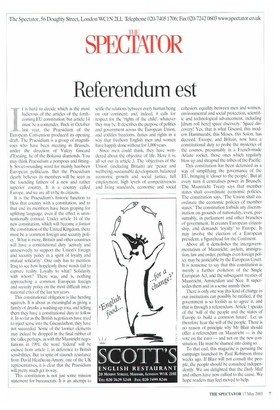SPECTATOR
Referendum est
I_ t is hard to decide which is the most ludicrous of the articles of the forthcoming EU constitution, but article 14 must be a contender. Back in October
last year, the Praesidium of the European Convention produced its opening draft. The Praesidium is a group of magnificoes who have been meeting in Brussels, under the direction of Valery Giscard d'Estaing, he of the Bokassa diamonds. You may think Praesidium a pompous and fittingly Soviet-sounding word for mainly has-been European politicians. But the Praesidium clearly believes its members will be seen as the founding fathers of a new and rather superior country. It is a country called Europe, and we are all to be its citizens.
It is the Praesidium's historic function to bless that country with a constitution, and to that end its members have been groping for uplifting language, even if the effect is unintentionally comical. Under article 14 of the new constitution, which will become a fortiori the constitution of the United Kingdom, there must be a `common foreign and security policy'. What is more, Britain and other countries will have a constitutional duty 'actively and unreservedly to support the Union's foreign and security policy in a spirit of loyalty and mutual solidarity'. One only has to mention Iraq to see how hopelessly those words fail to capture reality. Loyalty to what? Solidarity with whom? There was, and is, nothing approaching a common European foreign and security policy on the most difficult international crisis of the last ten years.
This constitutional obligation is like herding squirrels. It is about as meaningful as giving a family of drunks a washing-up rota, and telling them they have a constitutional duty to follow it. In so far as the British negotiators have tried to inject sense into the Giscardathon, they have not succeeded. Some of the loonier elements may indeed be dropped in the final rubber of the talks; perhaps, as with the Maastricht negotiations in 1991. the word 'federal' will be excised from article 1, in deference to British sensibilities. But in spite of staunch resistance from David Heathcoat-Amory, one of the UK representatives, it is clear that the Praesidium will pretty much get its way.
This constitution is not just some mission statement for bureaucrats. It is an attempt to settle the relations between every human being on our continent; and, indeed, it calls for respect for the 'rights of the child', whatever they may be. It describes the purpose of politics and government across the European Union, and codifies freedoms, duties and rights in a way that freeborn English men and women have happily done without for 1,000 years.
Since men could think, they have wondered about the objective of life. Here it is, all set out in article 3. The 'objectives of the Union' (including Britain) are 'peace and wellbeing, sustainable development, balanced economic growth and social justice, full employment, high levels of competitiveness and living standards, economic and social
cohesion, equality between men and women, environmental and social protection, scientific and technological advancement, including [drum roll here] space discovery.' Space discovery! Yes, that is what Giscard, this modern Hammurabi, this Moses, this Solon, has decreed. Europe, and Britain, now have a constitutional duty to probe the mysteries of the cosmos, presumably in a French-made Ariane rocket, those ones which regularly blow up and shrapnel the tribes of the Pacific.
This constitution has been defended as a way of simplifying the governance of the EU, bringing it 'closer to the people'. But at every turn it centralises power in Brussels. The Maastricht Treaty says that member states shall co-ordinate economic policies. The constitution says, 'The Union shall coordinate the economic policies of member states.' The constitution forbids any discrimination on grounds of nationality, even, presumably, in parliament and other branches of government. It creates European citizenship, and demands 'loyalty' to Europe. It may involve the election of a European president, a figurehead for the Continent.
Above all, it demolishes the intergovernmentalism of Maastricht; asylum, immigration, law and order, perhaps even foreign policy may be justiciable by the European Court. It is nonsense to say that this constitution is merely a further evolution of the Single European Act, and the subsequent treaties of Maastricht, Amsterdam and Nice. It supersedes them and in a sense annuls them.
There is only one way this kind of change in our institutions can possibly be ratified, if the government is so foolish as to agree it, and that is through a referendum. Article 1 speaks of the 'will of the people and the states of Europe to build a common future'. Let us therefore hear the will of the people. There is no reason of principle why Mr Blair should offer a referendum on Maastricht — in the vote on the euro — and not on the new constitution. He must be shamed into doing so.
To that end, this magazine is pursuing the campaign launched by Paul Robinson three weeks ago. If Blair will not consult the people, the people should be consulted independently. We are delighted that the Daily Mail and others have now rallied to the cause. We hope readers may feel moved to help.


































































































 Previous page
Previous page